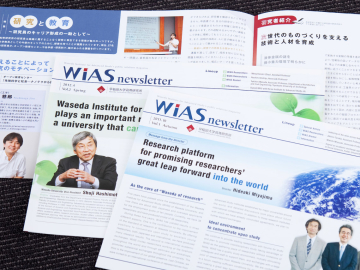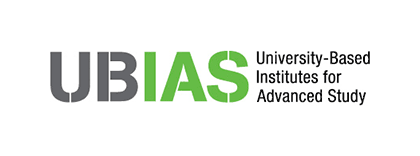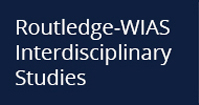Researchers
In 2014, we welcomed fourteen new members into the Advanced Research Institute. We asked each of them to briefly introduce their research fields.
| Aoki, Hitomi | Adult guardianship is a system to protect individuals who have insufficient ability for decision-making, and this system is stipulated in the Civil Code in Japan. This study aims to construct a new system suited for contemporary social needs. I also refer to the Civil Codes of Australia, Germany and Switzerland for comparative study of the law. |
| Orihara, Kanami | I am investigating allergies from a new and emerging field of neuroimmunology. Seeking to clarify the role of a type of neurotransmitter receptors in immune regulation, I am currently aiming to delineate a mechanism of the receptor-mediated molecule contributes to immune imbalance, leading to chronicity in allergies. |
| Kuroda, Yoshiyuki | Host-guest compounds, in which inorganic host materials with internal nanospace accommodate guest molecules, show unique guest exchange behavior when their sizes are drastically reduced. In this project, I will investigate this issue from the viewpoint of inorganic synthetic chemistry and tackle the development of novel high-performance materials such as adsorbent, energy storage, and so on. |
| Konno, Tomohiko | We have three networks as famous examples: regular networks, random networks, and scale-free networks. I have studied models of networks and investigated how the outcomes of the models are affected by the properties of underlying networks. Now, I am interested in the research related to probabilistic methods. |
| Sugiyama, Hiroaki | Prior to the publishing boom and typography, Sacre Rappresentazioni (Mistery Play) was the largest mass media in the world. Focusing on Italy in the 15th century when it was staged most actively, this research aims to elucidate the role of Sacre Rappresentazioni in the community through an examination into the actual condition of script, performance and acceptance. |
| Suzuki, Masanobu | My specialty is ancient Japanese history. I study the formation process of the ancient nation, the connection from ancient times down to the modern times, and the culture of its own. Specifically my study themes are the ancient clans and the local rule systems, the reason why a genealogy was made, the birth of a primitive religion, and cultural exchange with the East Asia. |
| Takeda, Kazuhisa | My research concerns the historical evolution of Native American Christianization in South America under Spanish rule, during the 16th to 18th centuries. I focus particularly on Jesuit mission history, seeking to clarify the development of globalization since the “Discovery” of America in 1492, from the viewpoint of Christian expansion and its socio-cultural impact upon the indigenous South American peoples. |
| Nishiwaki, Masato | My research interest is in developing empirical frameworks for dynamic game models and applying these newly developed frameworks to the analyses of real world markets. My work is useful for analyzing the markets where strategic interaction among forward-looking agents plays an important role in determining the market outcomes. More concretely, my work will provide tools for the empirical analyses of antitrust issues, such as evaluating the welfare effect of mergers and detecting collusion in oligopolistic industry. |
| Noda, Jin | My research topic is the history of Central Asia through the Russo-Chinese (Qing) relations. Much attention is focused on the demarcation between Russian and Qing empires from the 1860s to the early twentieth century, and the cross border movement of such ethnic groups as Kazakhs, Uyghurs, and Hui Muslims. The goal of the research is to understand the process of the formation of ethnic identities of these groups. |
| Matsuo, Miwa | My major research interest is the quantitative evaluation of social and economic impacts of transportation network development. Currently, I assess the efficiency and effectiveness of local bus services in Japan and the U.S. The assessment will explore the desirable future of local bus networks and the justifiable level of subsidy to maintain the networks. |
| Matsuoka, Ryoji | My area of specialization is sociology of education. I quantitatively investigate how social inequalities in educational attainment emerge in Japanese society. The following journal article is an example of my work: Matsuoka, R. School socioeconomic compositional effect on shadow education participation: Evidence from Japan. British Journal of Sociology of Education, 2013, DOI: 10.1080/01425692.2013.820125. |
| Mizuno, Shuntaro | How did the Universe begin? This is the most fundamental question that people always have raised. Equipped with the knowledge of physics, modern cosmology can answer this question to some degree. My hope is to understand cosmic inflation and dark energy which are still unsolved problems in modern cosmology. |
| Yamamoto, Daisuke | We study the macroscopic properties of correlated many-body systems, such as superfluidity, superconductivity, and magnetism, from a microscopic point of view. When the temperature becomes much lower than the room temperature, materials exhibit a quantum-mechanical behavior that is normally hidden by thermal fluctuations. A wide variety of physical properties induced by quantum statistical mechanics have potential for discovering new useful materials and technologies. |
| Rombs Soroczan, Elvyra | My research relates to ‘human flourishing,’ or processes of optimal wellbeing and realisation of higher potentials. Specifically, I explore how human flourishing is socially constructed and practiced within higher education – for example, teaching/learning practices through which students and faculty flourish in the classroom. Through this work, I hope to suggest strategies to encourage and enhance flourishing in Japanese universities. |
Projects
Quantitative Analysis for Politics, Economy and Law (Social Science Field)
By having quantitative analyses serve as a common interface, this project promotes mutual exchanges among the researches of the graduate schools of Waseda University which, heretofore, were undertaken individually.
May 12, 2014 Waseda Organizational and Financial Economics Seminar
Horizontal Mergers and Divestment Dynamics in a Sunset Industry

The research that I am working on is an experimental study using structural estimation. Structural estimation is a way to statistically select from observation data, a theoretical model explaining the behavior of individuals and companies, while estimating the parameters of the model. An important purpose of structural estimation is to estimate the parameters that do not depend on the environment. These are referred to as structural parameters, and determine the behavior of individuals and companies. By making use of the selected model and the parameter estimates, it is possible to estimate how individuals and companies behave in an environment different from the environment in which the data were obtained.
Making an environment that is different from this reality, which is called a counterfactual experiment, is an extremely useful experimental research method for economics, especially when direct application and experimentation are difficult. Using the dynamic game model in my research, I am verifying the influence of mergers on the society by comparing the real market where a merger occurs with the virtual market where a merger does not occur in a counterfactual experiment.
> more information about this project
Activity
This section introduces exchange activities and other events at WIAS.
Visit to Industrial Plants (June 27, 2014) –Combined Lunch/Dinner Seminar
 For the first combined lunch/dinner seminar project, we visited the TOSHIBA Keihin Plant and KIRIN BEER’s Yokohama Factory, thanks to Prof. Hiroyuki Kawada, our Associate Director.
For the first combined lunch/dinner seminar project, we visited the TOSHIBA Keihin Plant and KIRIN BEER’s Yokohama Factory, thanks to Prof. Hiroyuki Kawada, our Associate Director.
At the TOSHIBA Keihin Plant, we went on a tour of the coal and nuclear power plant turbine factories, as well as the TOSHIBA Ge Turbine Components Co. (TGTC), which manufactures steam turbine blades. We were able to see the turbine manufacturing process, which is rarely accessible. It was also a good opportunity to study the stable supply of electric power and methods of protecting the environment.
During the Question & Answer session, there was a lively exchange of opinions between Kentaro Takagi, the Turbine Maintenance Designer at the Motor Department of the Keihin Plant, and members of the Advanced Research Institute. Topics included the ever-intensifying global competition, the plant’s employment structure (e.g., the age and gender of employees), and ongoing work to restore facilities after the Tohoku Earthquake.
At KIRIN BEER’s Yokohama Factory, we attended a lecture by Mr. Iwao Nakajima, a senior researcher at the Alcohol Research Institute (based in the R & D headquarters) on the history and development of the brewery. We learned that this Japanese brewery was founded in the early Meiji era; we also had a chance to extend our knowledge of the various technologies used to produce each product. It was particularly interesting to hear an explanation of the mechanism that produces an exhilarating, cool sensation; this made us appreciate the efforts made by the brewery’s researchers and technologists. We discussed a wide variety of topics, including an overview of the institute, the impact of alcohol on the brain, non-alcoholic beer, and the effect of different kinds of packaging on bottled and canned beers. Later, we watched the actual brewing process and received a detailed explanation of the KIRIN BEER range of products. At the end of the visit, a social gathering was held at Spring Valley, an annex of the KIRIN BEER’s Yokohama Factory, giving participants an opportunity to socialize and make friends.
Information
Visiting Fellows
WIAS invites distinguished, internationally active researchers from overseas. Through scholarly exchanges, seminars, and other activities jointly undertaken with Waseda researchers, WIAS contributes to the invigoration of the university’s research activities.
> more information
| April 1, 2014- April 30, 2014 |
PUDELKO, Markus:Professor, Director of the Dept. of International Business, Vice Dean and Associate Dean for International Affairs, Faculty of Economics and Social Sciences, Dept. of International Business, Tuebingen University (Germany) |
| April 1, 2014- April 30, 2014 |
CURINI, Luigi:Associate Professor, Dept. of Social and Political Studies, the University of Milan (Italy) |
| April 4, 2014- April 27, 2014 |
SCHAUB, Jean-Frederic:Full Professor, History Department, Ecole des hautes etudes en sciences sociales (EHESS) (France) |
| April 18, 2014- May 18, 2014 |
SMITH, Rodney:Associate Professor, Department of Applied Economics, University of Minnesota (USA) |
| May 28, 2014- June 28, 2014 |
CHAPMAN, David:Senior Lecturer, Division of Education, Social Science and Arts, University of South Australia (Australia) |
| June 25, 2014- July 25, 2014 |
SOLA BELDA, Carles:Associate Professor, Business Department, Universitat Autonoma de Barcelona (Spain) |
Please feel free to contact us.
Waseda Institute for Advanced Study (WIAS)
1-6-1 Nishi Waseda, Shinjuku-ku, Tokyo 169-8050, JAPAN
URL:www.waseda.jp/inst/wias/
TEL:03-5286-2460
FAX:03-5286-2470
E-mail:[email protected]
![]()
![]()







